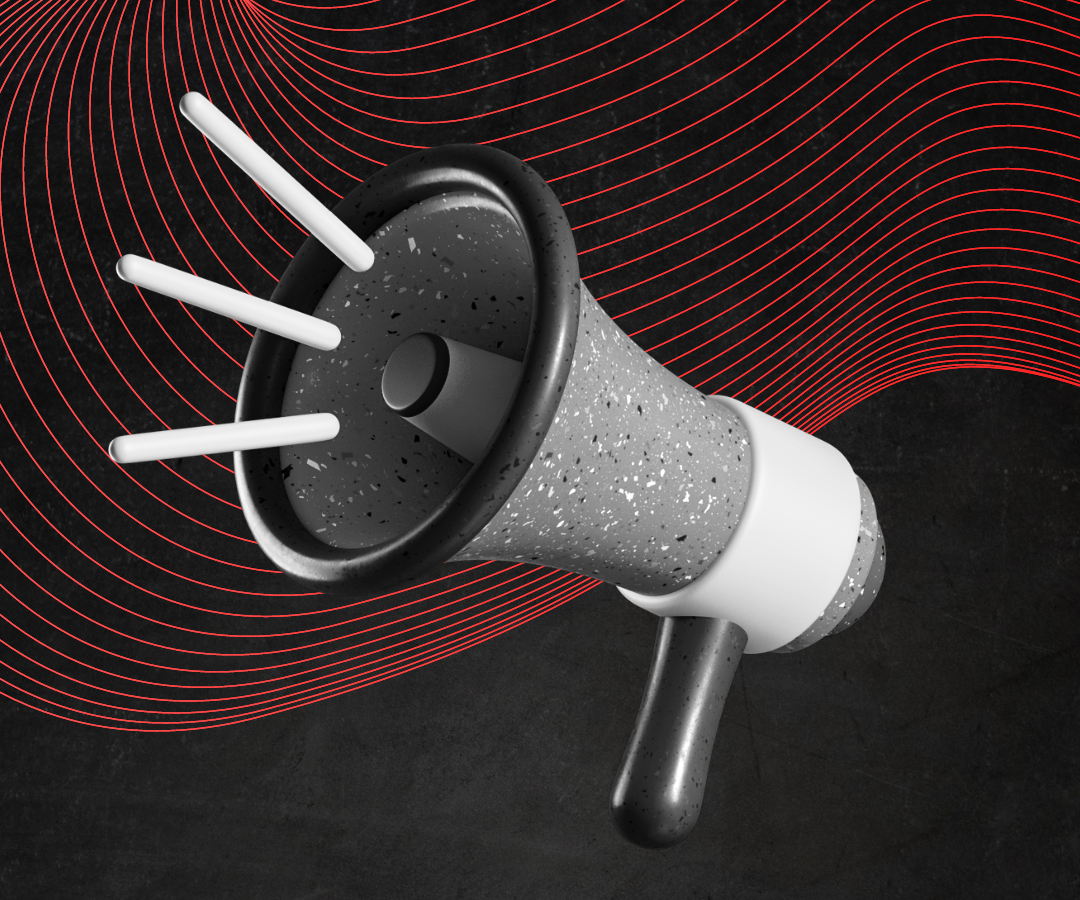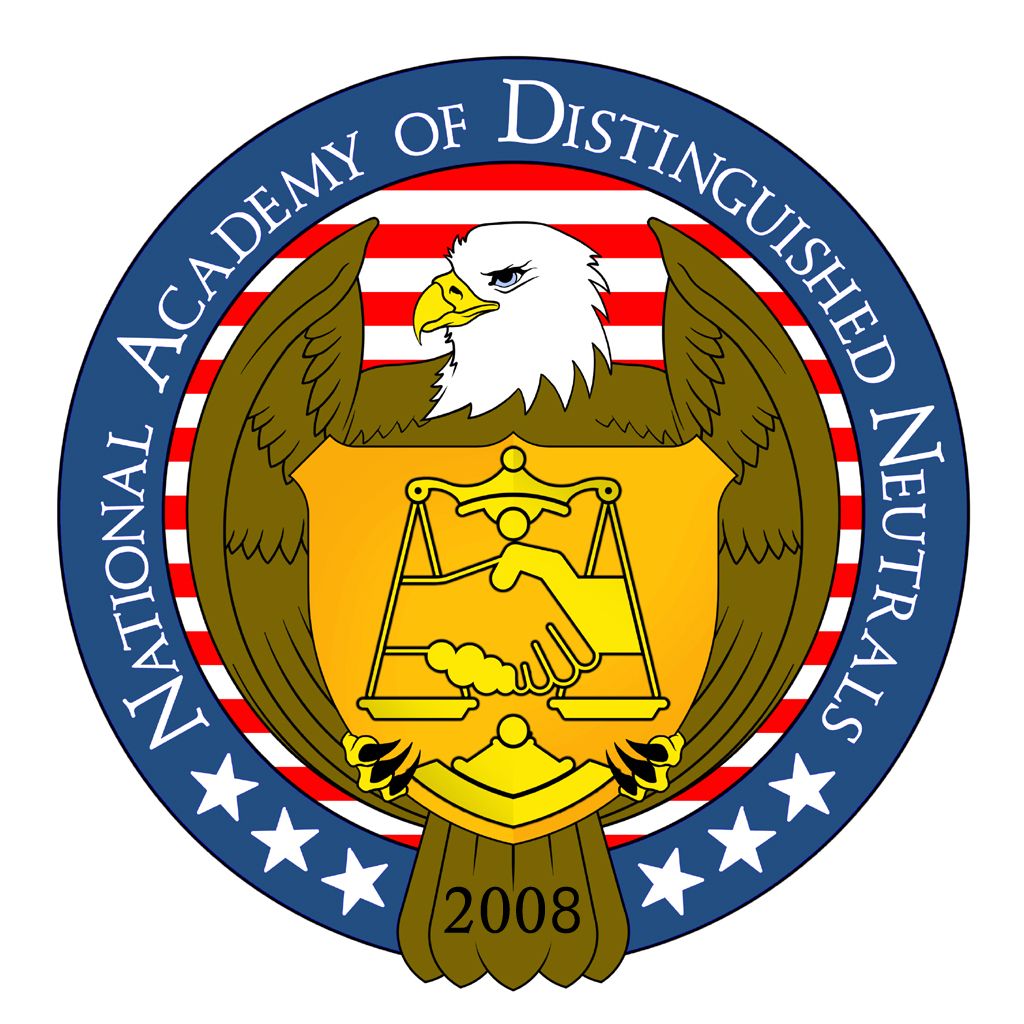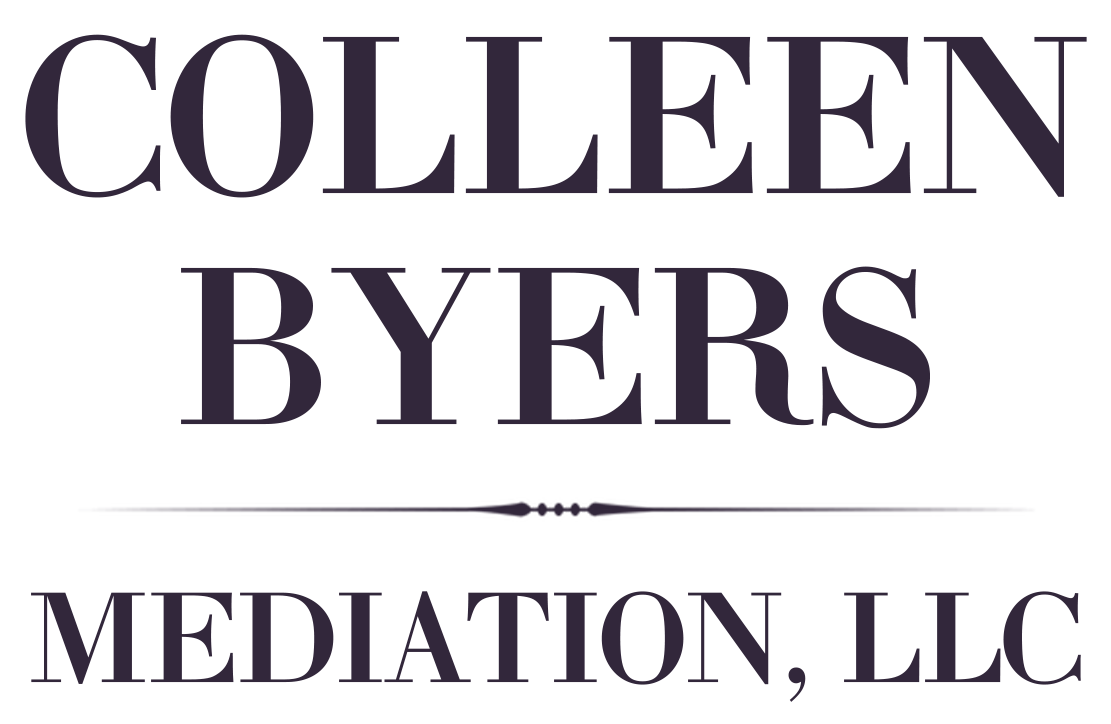Address
2806 Reynolda Road, # 211
Winston-Salem, NC 27106
Get in touch
(336) 499-1977
colleen@byersmediation.com
Blog

By Colleen Byers
•
January 8, 2025
What Attorneys and Mediators Need to Know On December 11, 2024, the North Carolina Supreme Court approved a series of important amendments to the Mediation Rules and Standards of Professional Conduct for Mediators. Effective on January 6, 2025, these changes impact key aspects of mediation practice in North Carolina. Below is a summary of some (although not all) of the recent amendments to the Standards of Professional Conduct for Mediators, and the Mediation Rules governing settlement procedures in Superior Court, Family Financial, and Clerk of Court matters. For comprehensive redlines to each rule set, visit https://www.nccourts.gov/news/tag/general-news/supreme-court-amends-mediation-rule-sets Superior Court Mediation Amendments New Mediator Designation Forms See Rule 2(a) & (b) There are now two separate forms for mediator assignment, depending on whether the mediator is party selected or court appointed. One form entitled Designation of Mediator By Agreement of Parties in Superior Court Action and Order of Appointment (AOC-CV-812) is for parties to designate a mediator of their choice, while the other form entitled Appointment of Mediator by Court Order in Superior Court Civil Action (AOC-CV-840) is for requesting a court-appointed mediator or for court staff to file a mediator appointment where the parties have been unable to agree on the selection of a particular mediator. It is important to note that in order for any of the parties to designate a mediator of their choice, all parties, including but not limited to unrepresented parties, must agree to designate said mediator. If all parties have not expressed agreement to designate a particular mediator, then the parties and/or their counsel must use AOC-CV-840 to ask the court to select a mediator. Attorney Signatures Removed from Mediated Settlement Agreement See Rule 4(c) & Rule 10(c)(9)(b) The requirement for attorneys to sign the final settlement agreement, alongside their clients, has been removed. Updates to the form Mediated Settlement Agreement (AOC-DRC-15 and AOC-DRC-16) are anticipated so be sure to use the most up to date forms in your mediations. Party Designee Signature See Rule 4(c)(4) A clarification was made regarding the ability of a designee to sign on a party's behalf if the party does not attend the conference in person . A designee may sign the agreement on behalf of a party only if the party does not attend the mediated settlement conference in person and the party provides the mediator with a written verification that the designee is authorized to sign the agreement on the party’s behalf. The Dispute Resolution Commission’s Advisory Opinion AO 42 provides mediators with further guidance when a designee wishes to sign for a party who does not attend the mediation in person. Substitution of Mediator See Rule 7(c) The form used to request mediator substitution by mutual consent of all parties has now been linked directly to Rule 7(c) (AOC-CV-836). This makes the substitution process more efficient and standardized. Family Financial Mediation Amendments New Mediator Designation Forms See Rule 2(a) & (b) Just like the Superior Court Civil Actions, the process for assigning mediators in family financial cases has been updated with two new forms. One form (AOC-CV-825) allows for party-selected mediators, and the other (AOC-CV-841) is used to request a court-appointed mediator. Substitution of Mediator See Rule 7(c) The same update regarding mediator substitution applies here as in the other rules, with the relevant form (AOC-CV-836) linked directly to this rule. Clerk of Court Mediation Amendments New Mediator Designation Forms See Rule 2(a) & (b) Similarly to the other updates, the process for assigning mediators in matters before the Clerk of Superior Court has been divided into two forms. One form (AOC-G-302) is used for party-selected mediators, while the other (AOC-G-314) is used to request court-appointed mediators. Attorney Signature Removal See Rule 4(b) As in the other rules, the requirement for attorneys to sign the final agreement with their client has been removed from Rule 4(b). Mediator Confidentiality Amendment Exception to Confidentiality See Standard 3(d)(2) This amendment creates an important exception to the general rule of confidentiality in mediation. Specifically, it allows a mediator to testify, give an affidavit, or tender an agreement if required not only by a statute (as previously excepted) but now also by a mediation rule promulgated by a state or federal agency. The change clarifies that a mediation rule also serves as the basis under which a mediator may be compelled to breach confidentiality. Summary: What You Need to Do As of January 6, 2025, the new and updated forms should be available for use at www.nccourts.gov, and it is important to ensure your practice aligns with these amendments. The most notable changes include the following: Two different mediator designation forms, Attorneys do not need to sign the settlement agreement, and Revised mediator substitution form.

By Colleen Byers
•
February 6, 2024
Managing Emotional Clients Colleen L. Byers collaborated with fellow neuroscience geek and mediator, Chris Osborn, to deliver this month’s Expert Continuing Legal Education (CLE) Series sponsored by the North Carolina Bar Association. Colleen co-presented about the impact of trauma on clients in the legal system and shared some practical tools for managing difficult emotions within ourselves (as lawyers or as mediators) as well as with our clients. View the CLE, which includes 1 hour of Mental Health/Substance Abuse credit in North Carolina here .
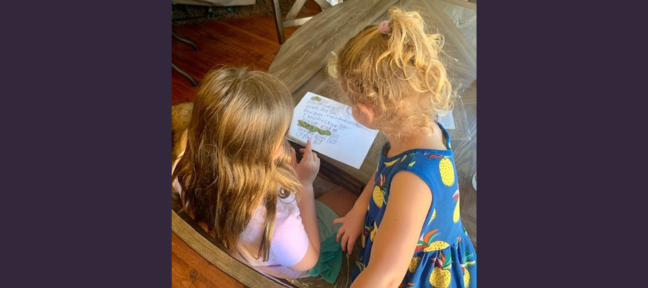
By Colleen Byers
•
January 31, 2024
You have been mediating and negotiating all day long. You are fully invested and can sometimes glimpse the fragile light at the end of the tunnel. Suddenly, all the momentum that has been slowly building all day seems to come to a screeching halt. How do you avoid crashing into an unbreakable impasse? First things first. Pause and take a deep breath. Then take another deep breath for good measure. Then get a sheet of paper and a pen. Along the left side of the paper, write the numbers 1 through 5. Now, with pen in hand, ask yourself these questions and write the responses next to numbers 1 through 5. What is the craziest idea I can think of to solve this problem? What is the second craziest idea I can think of to solve this problem? What is a variation of the other side’s idea that would work for me with an adjustment? What is another idea? What else might work? You have now generated five new possible ways to solve this problem that you can share with the other side to keep the negotiation moving forward and avoid running straight into an impasse. Let me give you a real-life example. My daughters were fighting over the most coveted seat on the couch. The older child asserted, “This is my spot. I always sit here.” The younger child claimed, “But I was here first today!” Unsurprisingly, their attempts to persuade the other to acquiesce were unsuccessful. They are not old enough to engage lawyers to determine who had the stronger legal claim to the coveted seat on the couch but they both came running to me pleading their respective cases in hopes that I would serve as the arbitrator. I declined to serve as an arbitrator but did put my mediator hat on. We all sat at the kitchen table with paper and pen to brainstorm possible solutions that would work for both of them. You may be wondering how I got my young children to do this. I told them that they could not watch any television until they found a solution to which they could both say yes. So down they sat with pen in hand. Using questions 1 through 5 above, as prompts, they generated the following ideas: Take turns – alternate days; Take turns – set a timer and then switch; Sit on top of each other; Build a fort on the couch for both of us. Then we went back through the list one by one, and I asked each child if they were a “yes” or a “no” for that particular idea. Here is what that looked like:
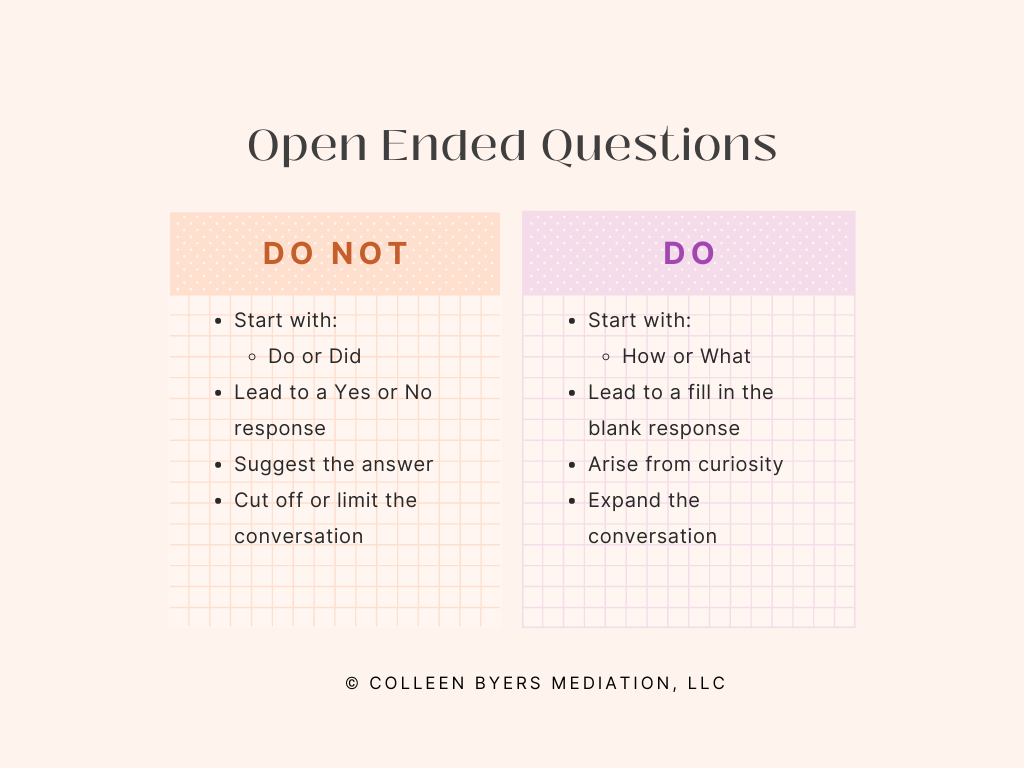
By Colleen Byers
•
November 30, 2023
How to Ask Better Questions Have you ever asked a question and then scratched your head at the response and wondered if perhaps you were not speaking the same language? Have you ever been in a meeting and asked a question only to be met with blaring silence and blank stares? Although we cannot control what may or may not come out of someone else’s mouth, we can follow a few simple steps to ensure that we ask better questions to set ourselves up for the most productive response possible. Step 1 – Lead with Your Why In one short sentence, tell the other person why you are asking the question. We previously outlined more details on how to accomplish Step 1 here . Step 2 – Use Open-Ended Questions Turn your internal interrogator off. No one likes being grilled and if they feel like you are interrogating them, they are going to clam up and not give you the information you seek. Instead, you open-ended questions. An open-ended question is one that does not suggest an answer.

By Colleen Byers
•
October 1, 2023
Two Critical Considerations for Any Mediation There are 2 things you absolutely need to consider before any mediation. The first is your BATNA, or the Best Alternative to a Negotiated Agreement, and the second is your WATNA, or the Worst Alternative to a Negotiated Agreement. If you have not analyzed these prior to coming to the negotiation table, then you have put yourself at a disadvantage for the mediation. How to Analyze Your BATNA Step 1: If you do not reach an agreement during mediation, what is the very best possible outcome you (or your attorney) could achieve in Court? In other words, if you are the Plaintiff, your attorney hits a grand slam and you are awarded all the compensatory (and punitive, if plead) damages you seek. If you are the Defendant, your attorney hits a grand slam and either blocks the Plaintiff from recovering anything or keeps the other side’s recovery to a minimum. This is $X. Step 2: If you do not reach an agreement during mediation, what is it going to cost you to achieve the very best outcome in Court? In other words, how much will you pay in court costs, plus attorneys’ fees, plus expert witness fees, plus time away from work, plus stress, plus damage to important relationships, etc. for you to achieve the very best outcome in Court? This is $Y. Step 3: Calculate $X minus $Y and this is your BATNA. How to Analyze Your WATNA Step 1: If you do not reach an agreement during mediation, what is the very worst possible outcome that could happen in Court? In other words, you (or your attorney) lose every argument in Court and the very worst happens. This is $A Step 2: If you do not reach an agreement during mediation, what is it going to cost you to end up with the very worst outcome in Court? In other words, how much will you pay in court costs, plus attorneys’ fees, plus expert witness fees, plus time away from work, plus stress, plus damage to important relationships, etc. for you to achieve the very best outcome in Court? This is $B. Step 3: Calculate $A + $B and this is your WATNA. If there are multiple different claims or causes of action to be negotiated, then you should conduct a BATNA and WATNA analysis for EACH separate claim. Then you should rank your claims so that you know which one has the best BATNA as well as which one has the worst WATNA. Calculating your BATNA and WATNA in advance of mediation helps you understand the range of possible outcomes and offers measurable data points as you consider settlement offers throughout the mediation process.

By Colleen Byers
•
August 29, 2023
Here are the answers to some of the most common questions people ask about mediation in North Carolina. 1. What happens at mediation? Mediation is an opportunity for the parties to tell the mediator what happened and how they feel about it. The mediator is a neutral facilitator who will listen to what everyone has to say and encourage the parties to find a solution to their dispute. In some cases, the parties will be in separate rooms and the mediator will go back and forth between the parties. In other cases, the mediator and the parties will all be in the same room and will discuss possible solutions around the same table. In either case, the mediator is not on anyone’s side but rather on the side of helping the parties to brainstorm solutions and make proposals to find a resolution. 2. Do I need a lawyer to go to mediation? No. You do not have to have a lawyer to go to mediation. However, if you choose to go to mediation without a lawyer, you should know that the mediator is prohibited from giving you any legal advice. 3. Can a mediator draft our settlement agreement? No. In North Carolina, a mediator is not allowed to draft a settlement agreement. If any party has a lawyer present during the mediation, then that lawyer can draft a settlement agreement. If no party has a lawyer present during mediation, then the mediator can prepare a non-binding summary of the parties’ understandings, which the parties can then take to a lawyer to subsequently turn into a final settlement document. 4. How long is mediation? It depends. The length of mediation varies greatly among matters and is impacted by the number of issues to be discussed and resolved. The duration of mediation also depends on how prepared you are for mediation. 5. Is mediation confidential? The mediator is bound by a duty of confidentiality and cannot reveal information about the mediation to anyone who did not participate in the mediation, except for the basic factual information needed to complete the mediator’s report to the court, if a lawsuit is already pending. The mediator never turns into a witness and never shares any information about settlement discussions with the judge or the jury. Additionally, a North Carolina rule of evidence protects the parties’ settlement offers from being admitted into evidence before the judge or the jury.




